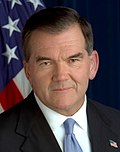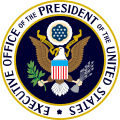A request that this article title be changed to United States Homeland Security Advisor is under discussion . Please do not move this article until the discussion is closed. |
| Assistant to the President for Homeland Security | |
|---|---|
 | |
| Executive Office of the President Homeland Security Council | |
| Member of | National Security Council Homeland Security Council |
| Reports to | President of the United States White House Chief of Staff United States National Security Advisor |
| Appointer | President of the United States |
| Constituting instrument | Homeland Security Act 2002 |
| Formation | 2001 |
| First holder | Tom Ridge |
| Deputy | Anthony Salisbury |
The assistant to the president for homeland security, commonly referred to as the homeland security advisor, is a senior aide in the National Security Council, based in the West Wing of the White House, who serves as principal advisor to the president of the United States on homeland security and counterterrorism issues.
Contents
The homeland security advisor is also a statutory member of the United States Homeland Security Council. Serving at the pleasure of the president, the homeland security advisor does not require Senate confirmation for appointment to the office.















